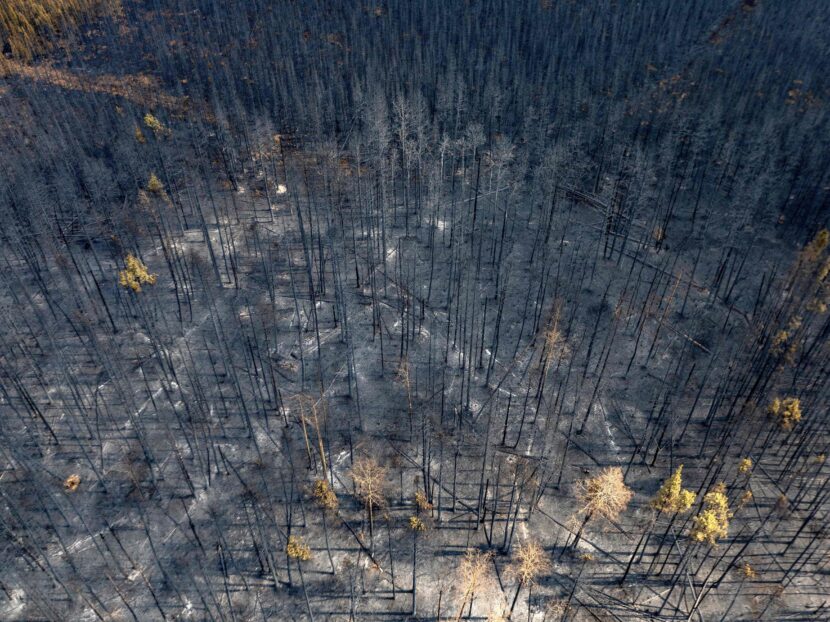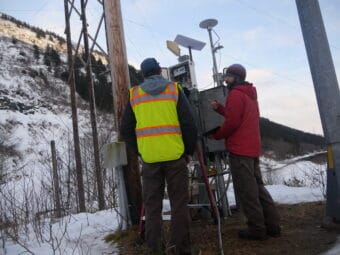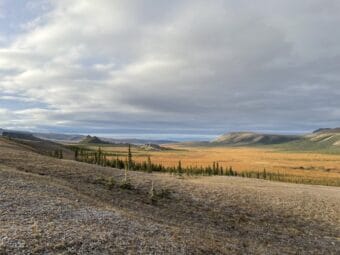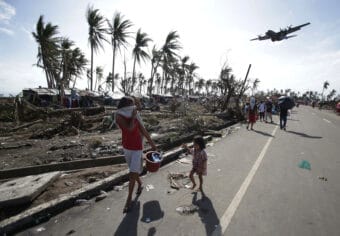
Copyright 2023 NPR. To see more, visit https://www.npr.org.9(MDEwMjQ0ODM1MDEzNDk4MTEzNjU3NTRhYg004))
Transcript :
MARY LOUISE KELLY, HOST:
Early and record-breaking wildfires are burning across multiple Canadian provinces from the east coast to the west coast. They’ve forced more than 50,000 people to evacuate this month. Some fires have been so huge smoke has drifted as far south as Philadelphia. Emma Jacobs reports.
JANINE MUISE: I can see the smoke billowing in the sky.
EMMA JACOBS, BYLINE: Volunteer Janine Muise steps outside the rec center in rural Shelburne County, Nova Scotia, to speak on the phone.
MUISE: When we first came here, we could – you know, you could smell it. There’s been a lot of calls that have been dropped. I think there may be some towers down.
JACOBS: Many of the 5,000 evacuees in this area have been stopping at the Red Cross shelter here to register – some with children and many with pets. Most plan to stay with friends and family, but others will sleep on cots set up in the hockey rink.
MUISE: Anxiety is the main thing, around their home. I mean, people have worked for years to build what they have. And then, all of a sudden, it’s just gone.
JACOBS: This fire, known as the Barrington Lake fire, has grown quickly, becoming the largest in the history of the province. Another wildfire on the outskirts of Halifax has destroyed around 200 structures – mostly houses – and forced another 16,000 evacuations. It’s unknown when they will be allowed to return home.
DAVE STEEVES: This is a very dangerous situation.
JACOBS: Dave Steeves with Canada’s Department of Natural Resources and Renewables said dry, windy weather today would create treacherous conditions for firefighting.
STEEVES: It’s changing every moment with wind, with fuels, with the lay of the land, how the sun is heating the fuels. Everything is constantly evolving.
JACOBS: Nova Scotia Premier Tim Houston has banned all travel and activity in the woods and pleaded with people to stop any behavior that could ignite more fires.
TIM HOUSTON: For God’s sake, stop burning – stop flicking your cigarette butts out your car window. Just stop it. Our resources are stretched incredibly thin right now fighting existing fires.
JACOBS: Halifax Deputy Fire Chief Dave Meldrum said the wildfire had hopscotched through neighborhoods, destroying some homes while leaving others nearby untouched.
DAVE MELDRUM: It’s terrible to see. There’s – you know, these are people’s homes. This is a community.
JACOBS: But it’s not just been a bad spring for fires in Nova Scotia. The area burned this year in the western province of Alberta is about half the size of Massachusetts.
MIKE FLANNIGAN: And this is the highest amount of area burned for May.
JACOBS: Mike Flannigan studies wildfires. He’s a professor at Thompson Rivers University in British Columbia.
FLANNIGAN: Things are still burning actively in British Columbia, Alberta, Saskatchewan, Northwest Territories and now Ontario.
JACOBS: He says climate change is exacerbating conditions that make for bigger, more destructive fires – more hot, windy weather and more dry vegetation.
FLANNIGAN: The warmer we get, the longer our fire seasons are. And we’re seeing that pretty well across much of Canada. Fire season starts earlier in the spring, goes later in the fall.
JACOBS: And these wildfires can have impacts far outside the fire line. Heavy smoke led to health warnings in Nova Scotia this week. And plumes of smoke from wildfires in western Canada led to air quality alerts in U.S. states from Colorado to Montana and Minnesota.
For NPR News, I’m Emma Jacobs in Montreal. Transcript provided by NPR, Copyright NPR.



